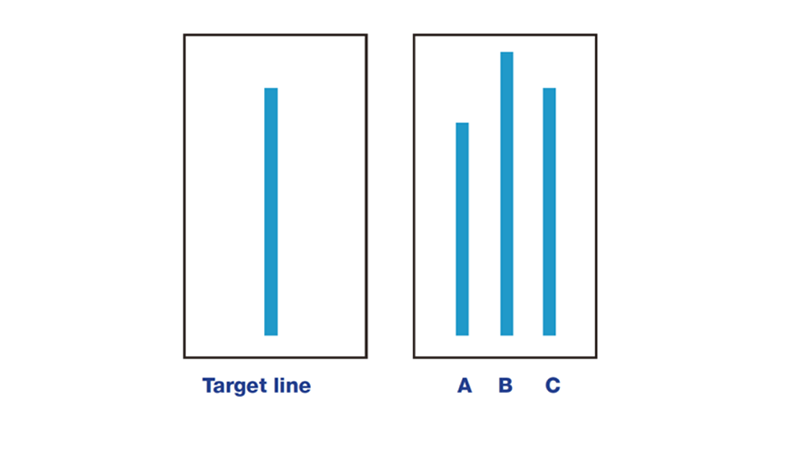
One of the most floated pieces of advice on the internet is “Don’t care about what others think”. It seems romantic, brave even, but it’s easier said than done.
From checking yourself in the mirror trying to decide if that cute girl from music class would find your attire attractive to keeping that one quirky habit of yours secret, we can’t help but care about what others think.
But we aren’t to blame, evolution is, as it has wired us to care about what others think, to conform.
An Interesting Experiment
Solomon Asch, a Polish-American psychologist carried out a series of experiments to demonstrate just how strong our urge to conform can be.
In one of them, every participant was placed in a room with 9 other “participants”, who were in reality, accomplices of the researchers. Then, each participant was shown three lines and asked to pick the one that was closest in length to the target line.
“But 32% of our perfectly able participants answered A.”

It’s obviously C, right? It would take a blind man to say otherwise. But 32% of our perfectly able participants answered A.
When each of the fake participants answered C (as they were told to), our real participants doubted themselves and some even disbelieved themselves.
Yes, that’s how strong our urge to conform can be. But why? A blog by Freedom In Thought explains this beautifully,
The story begins 200, 000 years ago with the birth of a little creature: a Homo Sapien or — in English — Wise Man.
For millennia, this creature was insignificant, weak, and unremarkable. It had not yet been honed by time and sat far from the top of the food chain. It survived by eating plants and the meager scraps of more dominant animals such as lions, hyenas, and jackals.
Yet, in a curious turn of events, it came to be the last surviving human species and has catapulted to the top of the food chain. The tables had turned and, instead of running from predators, Sapiens had become big game hunters.
Thanks to natural pressures, Sapiens had evolved the capacity to cooperate in large and complex groups; even the strongest lion was no match for a well-coordinated tribe of humans. Alone, even the smartest of their kind couldn’t get very far. But, collectively, they could soar through the skies and enter the cosmic realm of the gods.
Like all species, Sapiens had to contend with the great filter: Nature. All entered but only those with the traits best suited for survival & reproduction made it out safely. Time and time again, Nature rewarded cooperative Sapiens with survival and reproduction. As a result, their group instincts became stronger.

Care Most About the Opinions of These Two Kinds of People
Now that it’s evident we care about what others think, the only thing we can do is choose whose opinions we care about and whose we don’t.
When I started working out, I was jeered and dissuaded by many. Despite feeling embarrassed and a bit let down, I plowed on. Fast forward a few years and the same peeps were flocking around me for fitness advice.
I didn’t achieve it on my own. While guys with pot bellies and drumstick arms jeered at me, jacked dudes with python arms at the gym doled out good advice and constructive criticism.
In life, it’s most often the ones at the top that try to lift you up and the ones at the bottom that try to drag you down. This brings us to the first kind — care about the opinions of those that are above or better than you and ignore that of those below.
As a writer, the feedback of editors, especially George J. Ziogas and my fellow writers, especially Ria Tagulinao, David Majister, and Julian Basić have greatly aided me in becoming a better writer.
Feedback and criticism, even harsh and negative ones by those better, as good or more successful than you can greatly help.
“In life, it’s most often the ones at the top that try to lift you up and the ones at the bottom that try to drag you down.”
The second kind
When I embarked on a weight loss journey, my mom was appreciative of it in the beginning but soon adopted a troubled look and advised me to take it easy.
I didn’t and soon came to regret that I didn’t. As I looked at the sunken eyes, dark circles, and hollow cheeks in the mirror, I realized I had made a mistake.
My mom was no fitness expert but she wished for my well-being and she was right. I had cut weight too aggressively.
An opinion that comes from a position of love and trust is worth caring about. On the flip side, one that comes from a position of hate isn’t. This is because negativity of any sort is highly infectious and as a result, not worth entertaining.
If you love and trust someone, care about their opinion. They might not always be right but they have good intentions and this means a lot. As psychologist Rick Hanson says,
Recognizing the positive intentions in others, we feel safer, more supported, and happier. And when others feel that you get their good intentions, they feel seen, appreciated, and more inclined to treat you well.
“An opinion that comes from a position of love and trust is worth caring about.”
Final Thoughts
We are wired to care about what others think of us but by consciously choosing whose opinions we give weight to and whose we don’t, we can control our happiness and success in life.
The only two kinds of people whose opinions are worth caring about are — ones that are where you want to be and the ones that wish for your well-being.
It’s like climbing a ladder where the one you trust and love holds the bottom and the one you look up to holds the top. A stable ladder will let you climb while an unstable one will make you fall down.
So before you care about someone’s opinion, ascertain if he/she is helping stabilize your ladder or shaking it to topple you. Moreover, before you even think about other’s opinions, care about your own.
It never ceases to amaze me: we all love ourselves more than other people, but care more about their opinion than our own. — Marcus Aurelius




Very interesting article